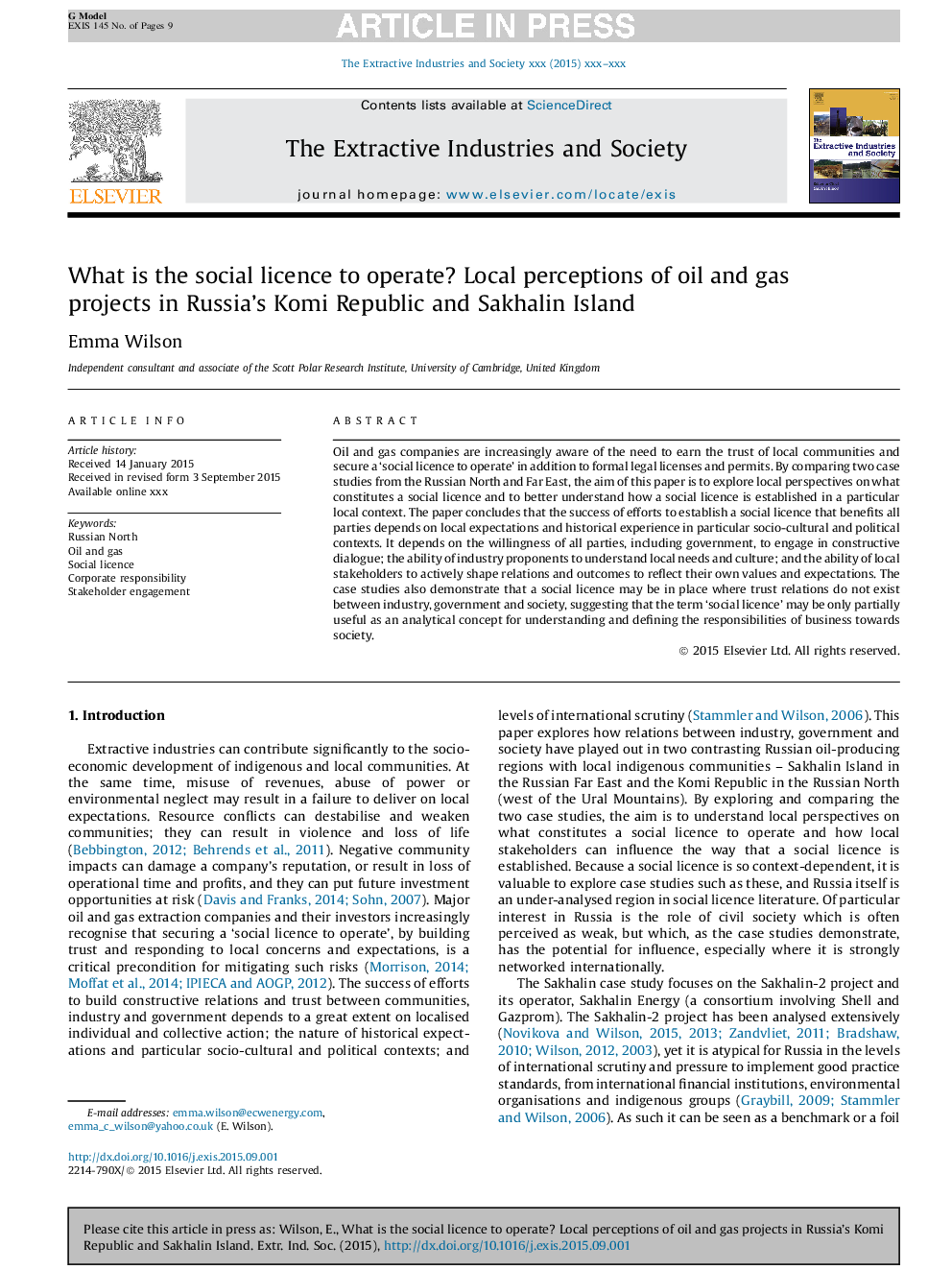| کد مقاله | کد نشریه | سال انتشار | مقاله انگلیسی | نسخه تمام متن |
|---|---|---|---|---|
| 10502188 | 945258 | 2016 | 9 صفحه PDF | دانلود رایگان |
عنوان انگلیسی مقاله ISI
What is the social licence to operate? Local perceptions of oil and gas projects in Russia's Komi Republic and Sakhalin Island
ترجمه فارسی عنوان
مجوز اجتماعی برای کار چیست؟ ادراکات محلی پروژه های نفت و گاز در جمهوری کوموی روسیه و جزیره ساخالین
دانلود مقاله + سفارش ترجمه
دانلود مقاله ISI انگلیسی
رایگان برای ایرانیان
کلمات کلیدی
شمال روسیه، نفت و گاز، مجوز اجتماعی، مسئولیت سازمانی، مشارکت ذینفعان،
ترجمه چکیده
شرکت های نفت و گاز به طور فزاینده ای از نیاز به کسب اعتماد جوامع محلی و ایجاد مجوز "اجتماعی برای کار" در کنار مجوز رسمی قانونی و اجازه نامه ها مطلع هستند. با مقایسه دو مطالعه موردی از شمال و شرق شرق روسیه، هدف این مقاله کشف دیدگاه های محلی در مورد آنچه مجوز اجتماعی را تشکیل می دهد و برای درک بهتر اینکه یک مجوز اجتماعی در یک محیط محلی خاص ایجاد شده است. این مقاله نتیجه میگیرد که موفقیت تلاش برای ایجاد مجوز اجتماعی که به نفع تمام احزاب است، بستگی به انتظارات محلی و تجربه تاریخی در موارد خاص اجتماعی و فرهنگی و سیاسی دارد. این بستگی به تمایل همه احزاب، از جمله دولت، برای شرکت در گفتمان سازنده است. توانایی طرفداران صنعت برای درک نیازها و فرهنگ های محلی؛ و توانایی ذینفعان محلی برای فعال ساختن روابط و نتایج برای نشان دادن ارزش و انتظارات خود. مطالعات موردی نیز نشان می دهد که یک مجوز اجتماعی ممکن است در جایی که اعتماد روابط بین صنعت، دولت و جامعه وجود ندارد، پیشنهاد می کند که اصطلاح "گواهینامه اجتماعی" ممکن است فقط بعنوان یک مفهوم تحلیلی برای درک و تعریف مسئولیت های کسب و کار به سوی جامعه
موضوعات مرتبط
علوم زیستی و بیوفناوری
علوم محیط زیست
مدیریت، نظارت، سیاست و حقوق
چکیده انگلیسی
Oil and gas companies are increasingly aware of the need to earn the trust of local communities and secure a 'social licence to operate' in addition to formal legal licenses and permits. By comparing two case studies from the Russian North and Far East, the aim of this paper is to explore local perspectives on what constitutes a social licence and to better understand how a social licence is established in a particular local context. The paper concludes that the success of efforts to establish a social licence that benefits all parties depends on local expectations and historical experience in particular socio-cultural and political contexts. It depends on the willingness of all parties, including government, to engage in constructive dialogue; the ability of industry proponents to understand local needs and culture; and the ability of local stakeholders to actively shape relations and outcomes to reflect their own values and expectations. The case studies also demonstrate that a social licence may be in place where trust relations do not exist between industry, government and society, suggesting that the term 'social licence' may be only partially useful as an analytical concept for understanding and defining the responsibilities of business towards society.
ناشر
Database: Elsevier - ScienceDirect (ساینس دایرکت)
Journal: The Extractive Industries and Society - Volume 3, Issue 1, January 2016, Pages 73-81
Journal: The Extractive Industries and Society - Volume 3, Issue 1, January 2016, Pages 73-81
نویسندگان
Emma Wilson,
